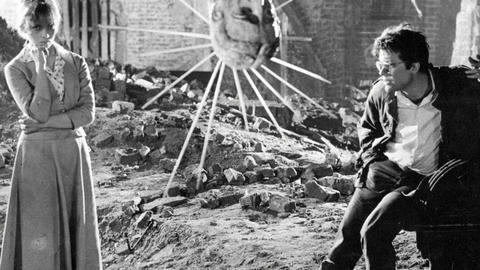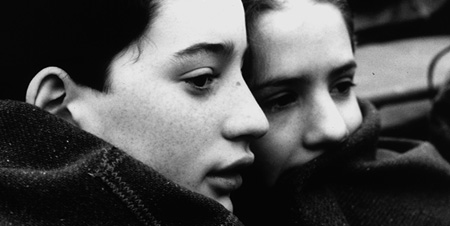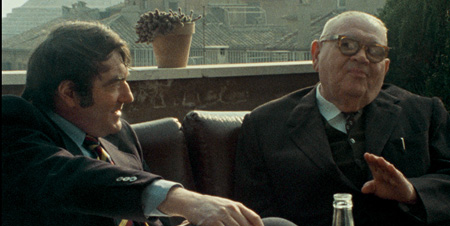
Conversations About Cinema: The Impact of Conflict
Posted on Wed 17 Dec 2014
Impact of Conflict is a new strand where will will explore the effects of war across people, society, places and politics through screenings, events and publishing. It's all about opportunities for you to share your responses - find out how you can get involved here.
Join us in a timely reflection on the repercussion of conflict and the ways this has been presented through film in this six month programme of films, events, and online resources
Last year's commemoration of the start of World War I was cause for reflection on the scale and impact of that war - and the immense global repercussions which still ripple 100 years later. The impact of war, any war, is not confined to the period between dates but goes far wider and deeper; it shapes people, society, places and politics. This programme will be the start of a conversation on many different themes, and you will be able to contribute in a variety of ways.
Presented by Watershed and cinemas across Wales, Northern Ireland and the South West & West Midlands, this six month season (Jan - June 2015) of screenings, events and online publishing will explore the wider cultural, human and socio-political repercussions of conflict and the countless ways this has been presented through film both then and now.
War is at once a test of societies and an agent of radical change. In the rubble of post-war worlds, another battle is fought between forces of conservatism longing for the restoration of a pre-war past and the forces of radicalism seizing an opportunity for creating new utopian futures out of the detritus of war.
The end result is that, tragically and ironically, post-war years can be fertile imaginative spaces of flux where new worlds are being imagined. Those new worlds can be political; the revolutionary movements that emerged across Europe in the aftermath of WW1, social; new demographic patterns and family structures, technological; – as the technology fast-tracked during war becomes available for civilian use, cultural; the rise of new art forms e.g. futurism. In the aftermath of war there is also a physical rebuilding with urban planners and architects reimagining cities amidst the rubble of the devastation.
The films we will screen throughout this six month season address the impact of war in a number of ways. We look at films made in the immediate post-war years to explore the visual and imaginative repertoire of filmmaking quite literally in the rubble (Rebels in the Rubble Sunday Brunches).
How was the ruined landscape – both literal and social – of post-world-war presented through film in the years before rebuilding? We also curate films that explore a number of the critical arenas where the impact of conflict reverberated in politics, society and culture and look at how historical conflicts have been explored in contemporary films.
Throughout the season there will be a variety of themes for exploration including: human rights violation, migration and displacement, racial tension, struggle with authority, post-traumatic stress, breakdown of family and social structure, healing and reconciliation.
As well as reflecting on the impact of World War I and II through films from the immediate post war periods and historical representations, we will bring the theme starkly up to date with a programme of partnership events and reflections on the impact of more recent conflicts and wars from across the globe from the Middle East and central Africa to Northern Ireland.
As a subject, conflict has always drawn filmmakers, whether driven by political or social ideals, or inspired by more humanitarian concerns. Now, however, with conflicts escalating across the globe, the political resonance of film is becoming ever more important; as a mechanism for observation and reportage, a means to document, a medium for comment and protest and a tool for learning and understanding.
The season runs from January until June 2015 and we will present new film releases and reissues of classics. See below for the confirmed films and events, and the multiple ways you can join the conversation. Conversations About Cinema is all about talking and reflection, and you can get involved in many different ways. We look forward to talking to you over these six months.
Tim Cole, Professor of History, University of Bristol
Mark Cosgrove, Cinema Curator, Watershed
January
Remember you can can always post your thoughts on our noticeboard or tweet using #convocinema or @wshed on any of these films throughout the month.
Rebels in the Rubble Sunday Brunches

Every Sunday in Jan at Noon
In the immediate aftermath of World War II filmmakers were already telling their stories of resistance, challenging pre-war orthodoxies or depicting the blurred morality ensuing from the chaos of the situation. These four films are classic examples of the above - from Roberto Rossellini's era-defining Rome Open City and Andrzej Wajda's Ashes and Diamonds, to the quintessential English constitutional challenge in Ealing's Passport to Pimlico and finally the murky moral universe of The Third Man.

Mon 12 Jan at 18:30 (Preview plus Satellite Q&A) then from Fri 16 Jan for at least two weeks
Vera Brittain’s beloved and powerful World War I memoir is exquisitely realised in this moving and very timely adaptation - a manifesto of the female experience of war and a sobering account of the loss of a generation.
- Join us for a Twitter chat on Tue 20 Jan from 18:30-19:30 with our Cinema Curator Mark Cosgrove and Tim Cole, Professor of Social History at the University of Bristol. Join in by using #convocinema.
- Professor Sarah Street, Film Studies at University of Bristol, will introduce the 17:30 screening on Wed 21 Jan and host an informal conversation on the film in the Café/Bar from 20:10 onwards. A ticket for this screening will get you 10% off drinks and items from our shared menu, so grab a drink or something to eat and let us know know your thoughts on Testament of Youth.

Fri 30 Jan for at least one week
This richly detailed, immaculately acted film traces the friendship between two 12-year-olds, one from a wealthy Catholic family through whose eyes the events are seen, the other a Jewish boy hidden by the priests, his identity concealed.
- Dr Martin Hurcombe, Reader in French Studies University of Bristol, will introduce the 17:40 screening on Thu 5 Feb and host an informal conversation on the film in the Café/Bar from 19:50 onwards. A ticket for this screening will get you 10% off drinks and items from our shared menu, so grab a drink or something to eat and let us know know your thoughts on Au Revoir Les Enfants.

Sat 31 Jan - Sun 1 Feb
Claude Lanzmann (87 and still going strong), director of Shoah, returns three decades after his cinematic milestone with a new ethical debate fashioned around his 1975 interrogation of Benjamin Murmelstein, a rabbi who became the chief Jewish elder at Theresienstadt, the concentration camp the Germans presented to the world as a model Jewish settlement.
As the season details are confirmed they will be published here - to be kept informed about more events in this season email comingsoon@watershed.co.uk with Conversations About Cinema as the subject, and you'll be the first to know when events go on sale.
Conversations About Cinema: Impact of Conflict is a BFI Film Audience Network initiative led by Watershed with QFT and Chapter Arts. Supported by the BFI's Programme Development Funds from the National Lottery.
